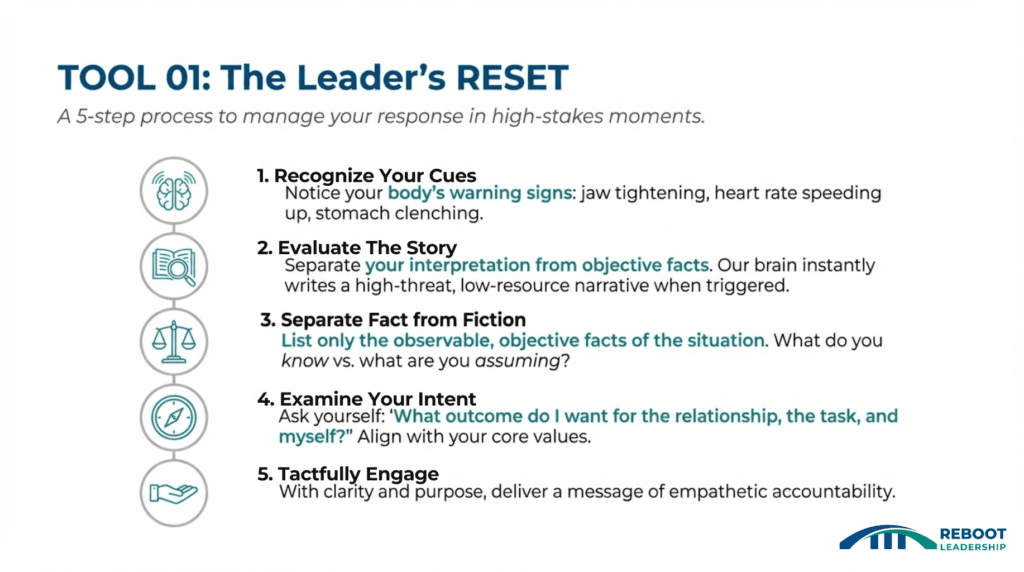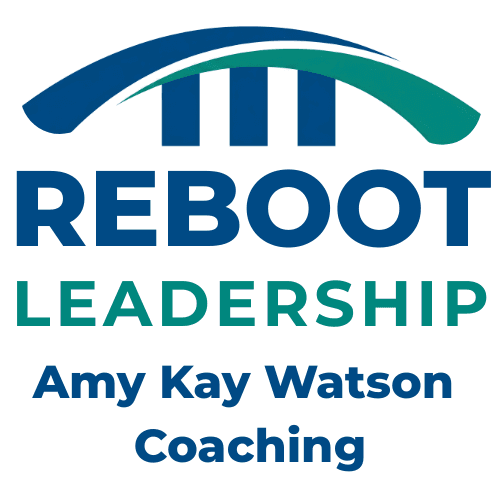A leader I coach recently described a frustrating pattern. During a critical planning session, she saw her engineers and Scrum Masters repeatedly stepping in to cover missing work from product managers who were on planned leave… work that should have been completed in advance.
While she was grateful for the stopgap effort, she recognized this “rescuing” was preventing accountability and burning out her team. She was triggered by the unfairness of the situation. Her first instinct was to call out the problem aggressively, but she knew that wouldn’t solve the long-term issue. She was stuck between her frustration and her desire to maintain crucial cross-functional relationships.
In today’s high-pressure world, it’s easy to feel overwhelmed. But for a leader, an unmanaged stress reaction isn’t just a personal problem; it’s an organizational one.
When we feel threatened (by a missed deadline, a public challenge, or a difficult situation) our brain’s threat-detection system floods us with stress hormones. This is a normal survival response. But in a leadership context, it creates a false, binary choice:
- React with Aggression: We become harsh, punitive, and miss the human element.
- React with Avoidance: We over-empathize, fail to hold a clear standard, and let problems fester.
Both reactions kill the psychological safety required for innovation and high performance. The most effective leaders reject this false choice. They know that a culture of empathetic accountability, holding high standards with deep respect, is their single greatest competitive advantage.
This is not a personality trait. It is a cognitive skill.
The ‘RESET’ Framework
You cannot control what you feel in a high-stakes moment, but you can learn to control your response. Instead of a vague checklist, you need a simple, repeatable process.
Based on decades of research into emotional regulation and cognitive science, I teach my clients a 5-step framework called The Leader’s RESET.
R = Recognize Your Cues
Your body gives you a warning before you react. Your jaw tightens, your heart rate speeds up, you feel a flush of heat, or your stomach clenches.
- The Science: This is interoception, or the awareness of your internal physiological state.
- The Action: Don’t judge the feeling. Just name it. “I am feeling defensive.” “My heart is racing.” This simple act of naming moves you from being the emotion to observing it. This is the critical first step to regaining control.
E = Evaluate the Story
When we are triggered, our brain instantly writes a story to explain the feeling. This story is almost always a high-threat, low-resource narrative.
- Story: “He is disrespecting me in front of the whole team.”
- Story: “She doesn’t care about this project.”
- Story: “I’m going to look like a fool.”
- The Science: This is a cognitive appraisal. Our brains are meaning-making machines, but our first interpretation is often flawed and defensive.
- The Action: Ask one question: “What story am I telling myself right now?” This creates just enough space to question its absolute truth.
S = Separate Fact from Fiction
Your “story” is an interpretation. You must separate it from the observable, objective facts.
- Story: “He is disrespecting me.”
- Fact: “He interrupted me twice during the budget review.”
- Story: “She doesn’t care about this project.”
- Fact: “Her report was two days late and missing two sections.”
- The Science: This is the core of cognitive reappraisal. You are actively shifting your interpretation to be less threatening and more precise, which calms the nervous system and re-engages your rational brain (the prefrontal cortex).
- The Action: Ask: “What are the objective, observable facts of this situation?” This prepares you to address the behavior, not the (assumed) intent.
E = Examine Your Intent
Now that you are calmer and clearer, you can align with your purpose. Before you act, ask yourself:
- “What is my highest intention as a leader in this moment?”
- “Do I want to win the argument, or do I want to solve the problem?”
- “Do I want to punish, or do I want to teach?”
- The Science: This connects you to your core values and leadership purpose. This “values-based” approach (a cornerstone of Acceptance and Commitment Therapy) is a powerful anchor, moving you from a defensive crouch to a confident, service-oriented stance.
- The Action: Define your ideal outcome. “My intent is to understand what happened with the report and to re-establish a clear expectation for next time.”
T = Tactfully Engage
You are now ready to have the conversation. You are anchored in your purpose and focused on the facts. You can now deliver a message of empathetic accountability.
- The Science: Research on procedural and interactional justice shows that feedback is accepted and acted upon when it’s perceived as fair. This happens when you are respectful (interactional) and your process is clear and unbiased (procedural).
- The Action: Use a simple, non-blaming script:
- Share the Fact: “I noticed the report was two days late.”
- State the Impact: “This is a problem because the finance team couldn’t start their analysis, which puts our project gate at risk.”
- Ask for Perspective (The Empathy): “I wanted to check in. What’s going on?”
- Hold the Standard (The Accountability): “I need to be able to count on you for these deadlines. What’s a better system we can put in place to ensure this is on time next time?”
This script is clear, kind, and non-negotiable on the standard.

You Don’t Need to Be Perfect. You Need a Process.
The world won’t stop being intense. Deadlines won’t disappear. But you don’t have to be at the mercy of every trigger, headline, or hard conversation.
Managing your emotional response is the foundation of effective leadership. It’s the skill that allows you to hold people to high standards with kindness, manage the stress of transitions, and build a team that is engaged, resilient, and high-performing.
This isn’t something you have to learn alone. This is the work I do with leaders and organizations every day. If you’re ready to move beyond theory and build a sustainable system for empathetic performance, let’s talk.



Pingback: The Self-Aware Leader: Mastering Empathy & Accountability - Amy Kay Watson